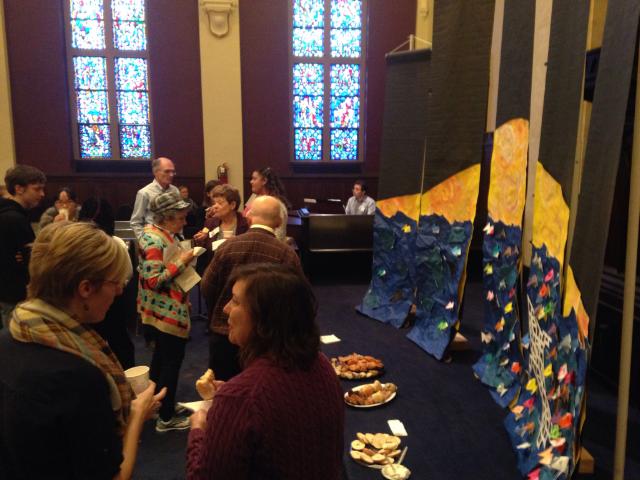What is Liturgy?
Liturgy is an ancient word meaning the work of the people. When a worshipping community gathers together for prayer, fellowship, service, or study, they create a liturgy.
Together, we each bring talents and wisdom that from a collective work. The work would be different if any one person was missing and is strengthened by each person present.
When we bring our whole selves as an offering to worship - whatever shape that may take - we encounter the divine in rich ways.
It's no secret that the church likes words. Bulletins and projection screens are packed full of text and become a prepared script for the leaders and congregation.
The focal point of most worship services is the sermon, anywhere from 5 to 30 minutes or more (depending on your tradition) of one person up front talking while everyone else listens. The only other setting where this happens is academia, yet even there, pedagogy is changing to account for multiple intelligences.
Words are important. At the time of the Reformation, the printing press was a new invention. It was a technology that enabled people to become literate and to read the scriptures for themselves in their own language, no longer relying on their priest for interpretation, a revolutionary idea for the time.
This new way of communicating to the masses brought with it a shift from concrete ideas and narrative, which are more easily expressed through images (like signs and stained glass), to abstract thought, which is more easily communicated through the written word.
New kinds of ministry and theological study came about as a result. Our world today would be very different without these influences.
But words aren't always enough. Cultures change and ours is evolving into a visual and experiential one. The internet and the many devices we use to connect to it are today's printing press, changing the way we communicate, learn, and think.
Now, we can share photos moments after snapping them, watch videos while on the bus or train, "like" just about anything we can imagine, and have an unlimited number of conversations at the same time (sort of) through texting. It is the age of image and interaction.
And yet, the church still operates predominately in words. By continuing to emphasize words in our practices, we lose touch with our larger community. Not only do we seem out of date and irrelevant, but our message becomes hard to understand, inaccessible, and even foreign.
Our message doesn't (necessarily) need to change. We are still trying to communicate the good news of a God who created the world, came to redeem it, and continues to actively work in it. But, we do need to change the language. If we don't, our message won't get through.
Can we move beyond words? I believe we can engage our whole persons in worship. Through engaging all the senses, not just hearing, reading, and thinking, we can open ourselves to transformation.
Just like sharing a meal with a friend fills our bellies and our hearts, touching a stranger reminds us we are not alone, and yoga embodies our prayers, our experiences as the Body of Christ can and should give glory to God in ways that touch our body, soul, and mind.
:: :: ::
Hello!
I am a liturgical artist, pastoral candidate, and graphic designer based in Washington, DC.
I work to bring the visual arts into the life and work of the church by curating worship experiences, facilitating workshops, and using good design practices to communicate the church’s message of grace.
By engaging more senses in the life of the church, I hope to help others move beyond words to find new connections with their spirit and with the Spirit.
Currently, I serve as Office Administrator and Digital Minister at Church of the Pilgrims in Washington, DC and work as a Creative Consultant.
I graduated from Wesley Theological Seminary (Washington, DC) with a Master of Divinity (MDiv) and from Roberts Wesleyan College (Rochester, NY) with a BS in fine arts and graphic design.
I am a candidate for ordination, certified ready for a call, under care of Newton Presbytery (NJ).
:: :: ::

